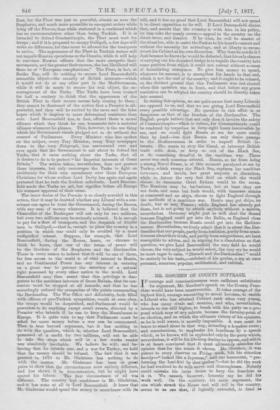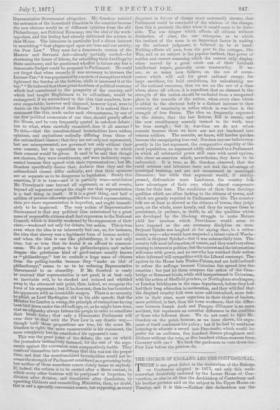MR. GOSCIIEN ON COUNTY SUFFRAGE.
IT courage and conscientiousness were sufficient 'substitutes for argument, Mr. Gosehen's speech on the County Fran- chise would have been unanswerable. It takes courage of the highest kind, courage amounting to moral heroism, to enable a Liberal who has attained Cabinet rank when very young, who has many rivals and enemies, and who, nevertheless, intends to rise still higher, to break with his party on a pro- posal which may at any minute become the turning-point of an election, and on which the ultimate victory of his opinions, as he is well aware, is morally impossible. A man must be brave to stand alone in that way, defending a hopeless cause.; and conscientious, to emphasise his loneliness by a speech which, as he knows, will be applauded only by the party which, nevertheless, it will be his life-long destiny to oppose, and which is at heart convinced that it must ultimately abandon the opinion that for the nonce it cheers. Mr. Gosohen, it was patent to every observer on Friday week, felt his situation keenly—" looked like a Japanese," said one humourist, " per- forming the hari-kiri by slow gashes "—but he did the work he had resolved to do with nerve and thoroughness. Nobody could mistake his inner desire to keep the franchise as it is. We cannot, however, honestly say he did his work well. On the contrary, his main argument, the one which struck the House and will tell in the country, seems to u coo that, if logically extended, is fatal to Representative Government altogether. Mr. aoschen resisted the extension of the household franchise in the counties because the new electors would be of different opinions from the old, Philanthropy, not Political Economy, was the idol of the work- ing-class, and the feeling had already dethroned the science in that' House. The labourers in particular had a direct interest in nourishing" that plague-spot upon our laws and our society, the Poor Law." They were for a democratic version of the Masters and Servants Act—already partially carried—for shortening the hours of labour, for rebuilding their d wellings by State assistance, and he questioned whether in future any but a democratic Budget could be proposed to Parliament. He could not forget that when recently it was necessary to increase the Income-Tax," it was popularised by a system of exemptions which lightened the burden at the bottom, while it increased it at the top," " He believed that those great doctrines of political economy which had contributed to the prosperity of the country; and which had taught Englishmen to be self-reliant, would be endangered, if we surrendered to the idea that numbers, how- ever respectable, however well disposed, however loyal, were to decide on the legislation of that House." It is natural that a statement like this, made under such circumstances, by one of the first political economists of our time, should greatly affect the House, and be very frequently quoted in out-door debate ; but to what, when carefully examined, does it all amount ? To this,—that the unenfranchised householders have wishes, opinions, and aspirations radically differing from those of the enfranchised classes ; that they are not only not represented, but are misrepresented, are governed not only without their own consent, but in opposition to any principles to which their consent would be given. It used to be said that though not electors, they were constituents, and were indirectly repre- sented because they agreed with their representatives ; but Mr. Gosehen specifically denies that, declares that they and the enfranchised classes differ radically, and that their opinions are so separate as to be dangerous to legislation. Surely this assertion, if it is true—and it is partially true—establishes Mr. Trevelyan's case beyond all argument, or at all events, beyond all argument except the single one that representation is a bad thing in itself. If it is a good thing, and half a million of persons otherwise qualified are denied representation, then pro Canto representation is imperfect, and ought immedi- ately to be improved. The very notion of Representative Government is that any political idea entertained by a great mass of responsible citizens shall find expression in the National Council, which is directly weakened by the suppression of their view,—weakened not only for debate, but action. This is true even when the idea is an inherently bad one, as, for instance, the idea that slavery was a legitimate form of human society ; and when the idea is one like philanthropy, it is not only true, but so true that its denial is an affront to common- sense. We do not profess to be philanthropists, and rather despise the gelatinous kind of good-nature usually known as " philanthropy," but to exclude a huge mass of citizens from the• polling-booths because they "make an idol of philanthropy," seems to us to be reducing Representative Government to an absurdity. If Mr. Goschen, is ready to contend that representation is not good, is at best only an inevitable evil, to be checked and reduced and whittled away. to the uttermost safe point, then, indeed, we recognise the force of his argument ; but if he does not, then he has furnished his opponents with an irresistible weapon. There is no necessity to plead, as Lord Hartington did in his able speech, that the Member for London is wrong, the principle of exemptions having been laid down under the old suffrage, or, as he might have done, that an= oligarchy always fattens the people in other to conciliate their brute force ; that only a Democratic Parliament will ever dare to deal with the Poor Law in any drastic way,— though both those propositions are true, for the more Mr. Goschen is right, the more unanswerable is his statement, the more completely has he established his opponent's case. This was the great point of the debate, the one on which the journalists instinctively fastened, for the rest of the argu- ments against the concession were comparatively feeble. They resolved themselves into assertions that this was not the proper time, and that the unenfranchised householders would not in- crease the strength of Parliament considered as a governing body, but neither of those assertions comes closely home to anybody. If, indeed, the reform is to be carried after a fierce contest, in which every other business will be postponed or forgotten, by division after division, and dissolution after dissolution, by upsetting Cabinets and remodelling Ministries, then, no doubt, this is not a specially convenient season, but supposing, as every
disputant in favour of change must necessarily assume, that Parliament could be convinced of the wisdom of the change, then this is precisely the time when it would seem to be desir- able. The one danger which affects all citizens without distinction of class, the one enterprise as to which the instinct of the mass is an important factor in making up the national judgment, is believed to be at hand. Nothing affects all men, from the peer to the cottager, like i War, and on no subject is the popular instinct, that power of sudden and correct reasoning which the masses only display when moved by a great event out of their habitual
intellectual torpor, generally more trustworthy. If we are, as so many men 'believe, on the eve of occur- rences which will call for great national energy, for largo sacrifices, for bold resolutions, for unhesitating use of the national resources, then we are on the eve of a time when, above all others, it is expedient that no element in the strength of the nation should be excluded from a recognised place in the councils of the nation, when every class which is added to the electoral body is a distinct increase to that certainty of unanimity in action which in war-time is the strength of free States. The idea so frequently expressed in the debate, that the last Reform Bill is recent, and the now constituency scarcely trained to its work, may be true enough ; but in war-time we do not refuse recruits because those we have are not yet hardened into veteran soldiers. The recruits, we know, will harden quicker because the campaigning is so real, Nor does any one believe very greatly in the last argument, the comparative stupidity of the rural population, an argument oddly addressed to a Parliament in which all substantial power still rests with tiered squires, who cheer an assertion which, nevertheless, they know to be unfounded. It is true, as Mr. Goschen observed, that the rural artisans and labourers have not had the advantage of municipal training, and are not accustomed to municipal discussion ; but while that argument would, if strictly pressed, disfranchise most Londoners, the country folk have advantages of their own which almost compensate them for their loss. The conditions of their lives develope qualities which are often lacking to the citizens of towns, and which are greatly required in Parliamentary life. The country folk are at least as shrewd as the citizens of towns, they judge men, on the whole, more keenly, and they far surpass them in , persistence, in patience, in thrift, in all the qualities which are developed by the life-long struggle to make Nature yield her increase which Providence would seem to have imposed as the one necessary discipline on man. Serjeant Spinks was laughed at for saying that, in a rather clumsy way—who would have suspected a latent vein of Words- worth in Serjeant Spinks I—but it was substantially true. The country folk need information, of course, and they need very often rousing to interest in politics ; but the interest and the information will come with power, and no one-who has watched their action when informed will sympathise with the Liberal contempt. The squires in the House hate Trades-Unions, and are half-inclined to refuse the suffrage because Unionism has spread into the counties ; but just let them compare the action of the Cam- bridge or Somerset hinds, while still inexperienced in Unionism, with the action of Sheffield grinders, or Nottingham stockingers, or London bricklayers in the same department, before they had had their long education in moderation, and they will find that the despised country folk were more self-restrained, more defi- nite in their aims, more sagacious in their choice of leaders, more political, in fact, than the town workmen, that the differ- ence between Joseph Arch and Peargus O'Connor is no mere accident, but represents an essential difference in the qualities of those who followed them. We do not want to fight Mr. Goschen on the point, because, as we have shown, his.argu- rnent of itself condemns his policy ; but if he had by assiduous lecturing to educate a crowd into Free-trade, which would he prefer for an audience, five hundred Sussex ploughmen and ditchers without the vote, or five hundred ribbon-weavers from Coventry with one ? We back the gardeners to vote down the Poor Law before the printers do.



































 Previous page
Previous page